|
Written by Jamie-Lee Pennesi, PhD, Postdoctoral Research Associate This blog was first posted on the F.E.A.S.T. website on 15th Dec 2021: https://www.feast-ed.org/eating-disorder-relapse-how-to-prevent-it/. The following blog is directed toward for someone who has or has previously had an eating disorder in mind, but it can also be helpful for a friend or a loved one, a therapist, or others who wish to support someone with an eating disorder or someone who is recovering from an eating disorder. In this blog I will talk about eating disorder relapse and provide helpful strategies and tips on how to prevent relapse. Recovering from an eating disorder is not easy. It takes a lot of courage, strength, perseverance, hard work, and support. Most people do not recover from an eating disorder without a few slips or occasional setbacks; that is normal, expected, and okay. ‘Relapse’ is when someone who is in recovery goes back to disordered eating or weight control behaviors. This is different from a ‘lapse’ which is a temporary slip or return to a previous problematic behavior (usually a onetime occurrence). It’s not uncommon for people who have recovered from an eating disorder to relapse. In fact, up to 60% of people who recover from an eating disorder will relapse in the first 1-2 months after treatment. The best way to prevent a relapse is through ‘relapse prevention’. Relapse prevention is a cognitive-behavioral approach used in treatment to identify and prevent high-risk situations, such as re-emergence of problematic eating and weight control behaviors, or negative thoughts about eating, body, weight, or shape. Relapse prevention often involves a personalized ‘relapse prevention plan’. A relapse prevention plan is developed during treatment with the therapist and is tailored to you. Here, one size does not fit all. For the best chance of success, a relapse prevention plan should include early warning signs, triggers, and high-risk situations specific to you, so that you can be prepared and ready to deal with any setbacks. A relapse prevention plan should consider the following issues:
Other strategies for preventing a relapse:
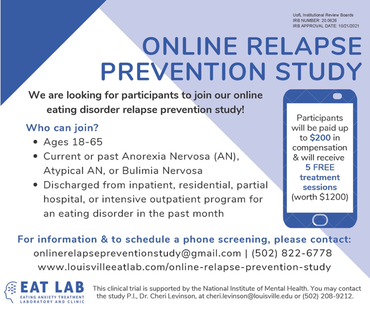 I hope this blog has provided you with important information about eating disorder relapse and given you useful strategies and techniques to consider using to prevent relapse. If you are looking for additional support or know someone who might need it, you may be interested to learn about our Online Eating Disorder Relapse Prevention Study. Participants are paid up to $200 in compensation and receive five sessions of free treatment which may help to decrease anxiety and eating disorder symptoms and may help to prevent eating disorder relapse. The information collected from this study may also be helpful to inform future treatments for eating disorders, prevent relapse, and promote full eating disorder recovery. We are looking for participants who 1) are aged 18-65, 2) have current or past anorexia nervosa, atypical anorexia nervosa, or bulimia nervosa, and 3) have been discharged from inpatient, residential, partial hospital, or intensive outpatient program for an eating disorder in the past month. Following a phone screening and online questionnaires, you will be asked to complete one of two five-session online treatment sessions and complete five follow up assessments. This study is conducted by the Eating Treatment Anxiety Lab at the University of Louisville and supported by the National Institute of Mental Health. For more information or to schedule a phone screening, please contact us at [email protected] or (502) 822-6778. Further information can also be found on our website at www.louisvilleeatlab.com/online-relapse-prevention-study. References: BC Children’s Hospital, Kelty Mental Health Resource Centre (n.d.). Relapse prevention. Retrieved from December 8, 2021, from https://keltyeatingdisorders.ca/recovery/relapse-prevention/ Fursland, A., Byrne, S., & Nathan, P. (2007). Overcoming disordered eating. Perth, Western Australia: Centre for Clinical Interventions. Iulia. [@iuliastration]. (2021, October 13). Progress is not linear Or the artwork which allowed me to expand my creative universe. I was so nervous about posting this half a year ago because it was so different from my previous work. One day I just went for it and it became one of my most loved creations. Yet another reminder to let that inner voice lead the way. Prints via link in Bio (this design is also available on a mug) #iuliastration #illustrationart #digitalart #procreate #illustratorsoninstagram #womenofillustration #mentalhealth #strongwomen #empowerment #motivation #dailymotivation #progress #growth #growthmindset #affirmations #quoteoftheday #quotestagram #strength #positivevibes #innerchild #positivethinking #healing [Instagram photo]. Retrieved from https://www.instagram.com/iuliastration Iulia. [@iuliastration]. (2021, September 9). Some days strength is just keeping it together – art and words by @iuliastration Prints via link in Bio #iuliastration #illustrationart #digitalart #digitalillustration #procreate #illustratorsoninstagram #procreateart #selflove #selfcare #yogapractice #spiritualart #yoga #meditation #growth #growthmindset #affirmations #feministart #motivation #dailymotivation #trusttheprocess #quotestagram #trustyourself #positivevibes #positivethinking #feminineenergy #goddess #strength #womenofillustration #illustrationoftheday [Instagram photo]. Retrieved from https://www.instagram.com/iuliastration Iulia. [@iuliastration]. (2021, July 10). Cheers to you! Prints available via link in Bio Free worldwide tracked shipping on all orders of 3 prints or more with code ARTLOVE #iuliastration #illustrationart #digitalart #digitalillustration #procreate #illustratorsoninstagram #procreateart #selflove #selfcare #selfcareideas #spiritualart #lookwithin #meditation #growth #growthmindset #affirmations #motivation #dailymotivation #trusttheprocess #quotestagram #trustyourself #positivevibes #positivethinking #feminineenergy #goddess #strength #womenofillustration #illustrationoftheday [Instagram photo]. Retrieved from https://www.instagram.com/iuliastration Iulia. [@iuliastration]. (2021, April 16). The journey of a lifetime Prints available via link in Bio #iuliastration #illustrationart #digitalart #digitalillustration #procreate #illustratorsoninstagram #procreateart #selflove #selfcare #selfcareideas #spiritualart #lookwithin #meditation #growth #growthmindset #affirmations #motivation #dailymotivation #trusttheprocess #quotestagram #trustyourself #positivevibes #positivethinking #feminineenergy #goddess #strength #womenofillustration #illustrationoftheday [Instagram photo]. Retrieved from https://www.instagram.com/iuliastration Iulia. [@iuliastration]. (2021, February 3). With time and care we bloom with time and care we bloom Prints available via link in Bio #iuliastration #illustrationart #digitalart #digitalillustration #procreate #illustratorsoninstagram #procreateart #selflove #selfcare #selfcareideas #spiritualart #lookwithin #meditation #growth #growthmindset #affirmations #feministart #motivation #dailymotivation #trusttheprocess #bodypositivity #trustyourself #positivevibes #positivethinking #feminineenergy #goddess #strength #womenofillustration #ladieswhodesign #illustrationoftheday [Instagram photo]. Retrieved from https://www.instagram.com/iuliastration Walsh, B. T., Xu, T., Wang, Y., Attia, E., and Kaplan, A. S. (2021). Time course of relapse following acute treatment for anorexia nervosa. American Journal of Psychiatry, 178(9), 848-853. https://doi.org/10.1176/appi.ajp.2021.21010026
0 Comments
Leave a Reply. |
Archives
January 2024
Categories |
- About
- People
- Our Research & Publications
-
Participate in Research
- Personalized Interventions and Outcomes: Navigating Eating Disorder Experiences and Recovery (PIONEER) Study (Online)
- Youth Eating Study (YES!)
- Tracking Restriction, Affect and Cognitions (TRAC) Study (Online)
- Virtual Reality Study
- Facing Eating Disorder Fears Study (Online)
- Personalized Treatment and CBT-E Study (Online)
- Body Project Summer Camp
- The Body Project
- Clinical Screener Study (Online)
- Clinic, Supervision, and Consultation
- Blog & In the Press
-
Archived Studies
- Predicting Recovery Study (Online)
- Online Single Session Resources
- Reconnecting to Internal Sensations and Experiences (RISE) Study
- Web-Based Mindfulness Study
- Personalized Treatment Study
- Online Imaginal Exposure Study
- In-Vivo Imaginal Exposure Study
- Daily Habits 3 Study
- Daily Mood Study
- COVID-19 Daily Impact Study
- Conquering fear foods study
- Louisville Pregnancy Study
- Approach and Avoidance in AN (AAA) Study
- Web-Based Mindfulness for AN & BN Study
- Barriers to Treatment Access (BTA) Study!
- Mindful Self-Compassion Study
- Network EMA Study
- Legacy of Hope Summit Report
- DONATE-CURE EATING DISORDERS!
- Directions
- Statistical Consultation
- About
- People
- Our Research & Publications
-
Participate in Research
- Personalized Interventions and Outcomes: Navigating Eating Disorder Experiences and Recovery (PIONEER) Study (Online)
- Youth Eating Study (YES!)
- Tracking Restriction, Affect and Cognitions (TRAC) Study (Online)
- Virtual Reality Study
- Facing Eating Disorder Fears Study (Online)
- Personalized Treatment and CBT-E Study (Online)
- Body Project Summer Camp
- The Body Project
- Clinical Screener Study (Online)
- Clinic, Supervision, and Consultation
- Blog & In the Press
-
Archived Studies
- Predicting Recovery Study (Online)
- Online Single Session Resources
- Reconnecting to Internal Sensations and Experiences (RISE) Study
- Web-Based Mindfulness Study
- Personalized Treatment Study
- Online Imaginal Exposure Study
- In-Vivo Imaginal Exposure Study
- Daily Habits 3 Study
- Daily Mood Study
- COVID-19 Daily Impact Study
- Conquering fear foods study
- Louisville Pregnancy Study
- Approach and Avoidance in AN (AAA) Study
- Web-Based Mindfulness for AN & BN Study
- Barriers to Treatment Access (BTA) Study!
- Mindful Self-Compassion Study
- Network EMA Study
- Legacy of Hope Summit Report
- DONATE-CURE EATING DISORDERS!
- Directions
- Statistical Consultation

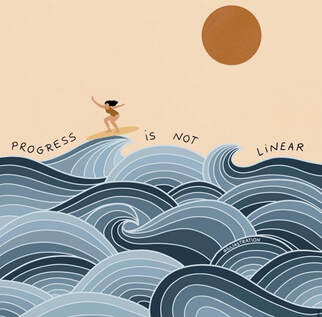
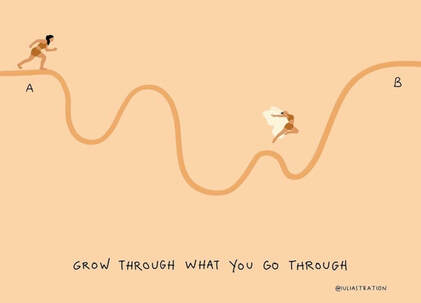

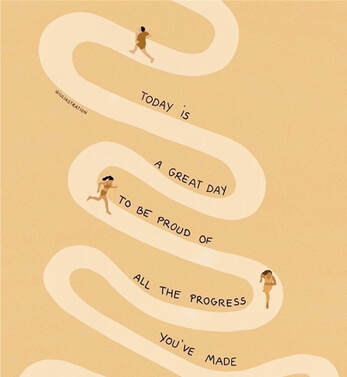
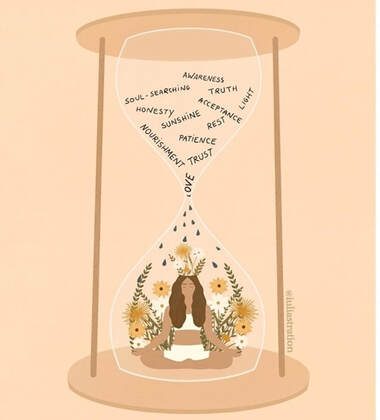
 RSS Feed
RSS Feed
